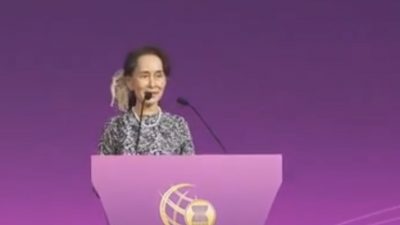Myanmar attracts investment from the Northeast Asian powers of China, Japan, and South Korea
Sawako Utsumi and Lee Jay Walker
Modern Tokyo Times

The economic powers of Northeast Asia continue to view the future of Myanmar in a positive light. Hence, continuing investments, infrastructural projects, political goodwill, and the collective understanding of the many difficulties that this nation faces are understood. This is a far cry from certain Western and Islamic nations that are hindering international investment by over focusing on a single issue, in coordination with the mass media.
Aung San Suu Kyi, the State Counsellor of Myanmar, is firmly focused on developing the country by supporting the entrenchment of democracy, building the infrastructure, reaching out to international investors, strengthening the constitution to safeguard democracy, and reaching out to different ethnic groups to solve protracted problems. If you look at many regional nations, then democracy remains beholden to the armed forces in Thailand and the one-party-state continues to rule in several nations including China and Vietnam. Therefore, the international community should be reaching out to the government of Aung San Suu Kyi based on democratic credentials and on the need to help Myanmar during its transitional period.
Recently, Aung San Suu Kyi stipulated, “Peace, tranquility, political stability and development for people cannot be separated. If there is peace, we can bring development to the people. We need a constitution that is accepted by the people to achieve peace. There should be reconciliation among our people.”
Thankfully, important Northeast Asian powers including China, Japan, and South Korea understand not only the geopolitical importance of Myanmar but the fact that it is the interest of the region to have stability and further the process of economic development. The same applies to other regional nations including India, Singapore, and Vietnam who seek to strengthen ties with Myanmar. Hence, it is high time for Western democratic nations to support a nation that is in transition and to overcome differences based on dialogue and mutual respect.
South Korea, following a similar approach taken by China and Japan, is focused on expanding its trade with Myanmar. Last year, it was reported that development between Myanmar and South Korea would create a reported 50,000 to 100,000 jobs after completion in five years time. This project will take place in the Yangon region. Also, with Japan investing in the Thilawa Special Economic Zone in a similar part of Myanmar, then the infrastructure and job creation will be a big boost to the economy.
On the Thilawa Special Economic Zone website about the role of Japan, it stipulates, “The Japan International Cooperation Agency (JICA) is a Japan’s administrative agency which provides bilateral aid in the form of technical cooperation, ODA loans and grant aid. For the Thilawa SEZ development, the Government of Japan and JICA provide all types of ODA assistance, including technical cooperation, Japanese ODA loans and grant aid to build power, water, communication, road, port and other infrastructure in the surrounding area, as well as to assist the management of Thilawa SEZ Management Committee.”
Northeast Asian nations and regional nations to Myanmar including India and Vietnam all seek to assist this nation in a plethora of ways. Equally important, in certain areas international investment and infrastructural projects can overlap. For example, the nations of China, India, and Japan have different roles to play in the railway sector that can enhance the collective even if this area is still in its infancy compared with the grand plans of the future.
Overall, it is important that Myanmar strengthens economic and political ties with an array of nations. Traditionally, in recent times, the nations of China, Singapore, Thailand, and Japan roughly in that order have been important in the area of imports and exports. Hence, despite South Korea playing catch-up, it is hoped that this nation will become equally important and the same applies to India and other nations like Malaysia.
Recently, Aung San Suu Kyi stated pointedly, “We cannot leave the heavy burden of conflict on the shoulders of the younger generations.”
Therefore, the approach of ending internal conflicts and attracting international investment and support is all aimed at creating a stable and prosperous Myanmar. Of course, the road is difficult but it will become easier if international nations support the current government of this nation and focus on the reduction of poverty based on economic and infrastructural initiatives.
http://www.myanmarthilawa.gov.mm/

PLEASE DONATE TO HELP MODERN TOKYO TIMES
Modern Tokyo News is part of the Modern Tokyo Times group
DONATIONS to SUPPORT MODERN TOKYO TIMES – please pay PayPal and DONATE to sawakoart@gmail.com
http://moderntokyotimes.com Modern Tokyo Times – International News and Japan News
http://sawakoart.com – Sawako Utsumi personal website and Modern Tokyo Times artist
https://moderntokyonews.com Modern Tokyo News – Tokyo News and International News
PLEASE JOIN ON TWITTER
https://twitter.com/MTT_News Modern Tokyo Times
PLEASE JOIN ON FACEBOOK